List of Pakistan Movement activists
.jpg)
The Founders and activists of the Pakistan Movement, also known as Founding Fathers of Pakistan, were the political leaders and statespersons who participated in the success of the political movement, following the signing of the Pakistan Resolution, that led the establishment and creation of Pakistan on August 1947.[1] Within this large group, a further and extended subset signed the signed the Objectives Resolution that was annexed to the Constitution of Pakistan in 1950.[2]
The term was first used by the linguist and archeologist dr. Ahmad Hasan Dani's book, the Founding Fathers of Pakistan (1998), which popularized the term in literary activities of the country.[3] The Pakistan Movement was led by a large group of activists and statesmen who played crucial role in the politics of the British Indian Empire in 1930s and 1940s.[3] More recently, the term was used by the government officially in explaining the foreign policy text.[4] Authors and historians of Pakistan more broadly define the term "Founding Fathers" to mean a larger group which also includes all those who, whether as politicians, jurists, statesperson, soldiers, diplomats, academicians, or ordinary citizens, took part in winning the independence of four provinces in the north-west region of British India from the control of the United Kingdom and also from the influence of the Indian Congress;[1][5][6][7] this creating Pakistan.[1]
The following is a list of notable people who played a prominent role in the Pakistan Movement as independence activists, leaders, freedom fighters or revolutionaries.
Historical background
.jpg)
In 1905, the Bengal presidency's partition was decided by the English government which was supported by the Muslims communities.[8] The success of the Swadeshi movement led by Indian activists led the reintegrating the presidency and it was a catalyst in making the Muslims reformers of India realize the need for a separate homeland.[8]
During the same year, the political efforts and initiations led by Sir Syed Ahmad Khan led the establishment of the historic All-India Muslim League (AIML) to protect the interests and rights of the Muslim regions in the subcontinent.[9] Mutual distrust among the Hindu leaders and Muslim reformers further grew.[10] A conference held as well as chaired by Indian Viceroy, Early Minto, the Hindu-Muslim conflict was raised to the constitutional plane.[10] In 1906, an annual meeting of Muhammadan Educational Conference was held by Nawab Vikar-ul-Mulk, Syed Ahmad Khan, and 3,000 other delegatesattended the session making it the largest-ever representative gathering of Muslim India.[11] Muslim cleric Ali Johar wrote All-India Muslim League's first agenda and Syed Ameer Ali established its European branch in the United Kingdom.[11]
For some quiet time, the Muslim League worked on its reputation and credibility against the much influential Indian Congress. It was not until when Liaquat Ali Khan and his companion Shrene Pant convinced Muhammad Ali Jinnah and among others to join the Muslim League in 1930s. The philosophical idea, Pakistan (Iqbal, 1930); the 14 points (Jinnah, 1929); the Now or Never (Ali, 1933); the Two-nation theory which was subsequently contributed and worked by many activists and leaders played a crucial role in gaining the creation of Pakistan in 1947.[12]
The newly founded country of Pakistan had to create a government and legislature to replace the British India government and the British Parliament.[13] The founding fathers of Pakistan first established the partial Constituent Assembly (which was replaced with Parliament), and adopted the Objectives Resolution was annexed to the Constitution of Pakistan.[13]
Occupations and finances
The founding fathers and activists as well had different occupations and practiced a wide range of high and middle-status occupations, and many pursued more than one career simultaneously.[14] However, the more influential founding fathers were trained and professional barristers and lawyers.[14] Notable activist, Sir Dr. Ziauddin Ahmed, was a mathematician who helped forming in the first educational policy of the country.[14] Woman activist, Ra'ana Ali Khan was an economist; Jahanara Shahnawaz was an sociologist; and Abu Bakr Ahmad, a political scientist; M.M. Sharif, a philosopher; and Shaukat Hyatt Khan, an officer in the British Army, are the quiet few notable personalities who played an integrated role in the movement.[14]
List of Founders of Pakistan
- This list is incomplete; you can help by expanding it.
| Name (Birth and date) | Portrait | Place of representation and origin | Pre-independence and Post-independence notability |
|---|---|---|---|
| Muhammad Ali Jinnah (1876–1948) |
 |
Karachi, Sindh | Founder of Pakistan First Governor-General of Pakistan First President-Speaker of the Constituent Assembly Presiding figure of the Muslim League |
| Allama Mohammad Iqbal (1877–1938) |
 |
Lahore, Punjab | Presented and conceived the idea of Pakistan Formalize the Two-Nation Theory Philosopher and Poet of Urdu language |
| Sir Syed Ahmad Khan (1817–1898) |
 |
Delhi | Presiding figure of the Muslim League Key inspiration of Pakistan Movement |
| Aga Khan III (1877–1957) |
 |
Karachi, Sindh | Key presiding figure of the Muslim League Led the Ismailism movement in support of Pakistan movement. |
| Liaquat Ali Khan (1895–1951) |
 |
Karnal, Punjab | First Prime Minister of Pakistan of Pakistan Author of Objectives Resolution |
| Fatima Jinnah (1893–1965) |
 |
Karachi, Sindh | Regarded as Māder-e-Pakistan Woman activist Younger sister of Muhammad Ali Jinnah Leader of the Opposition during 1965 elections |
| Sir Muhammad Zafarullah Khan (1893–1985) |
 |
Daska, Punjab | Author of the Lahore Resolution and chief negotiator of Radcliffe line The main Representative of the Pakistan Movement in the International community First Minister of Foreign Affairs of Pakistan |
| Fazlul Huq (1873–1962) |
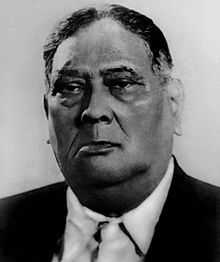 |
Jhalokati, Bengal | Ascended as Interior Minister of Pakistan Governor of East Pakistan |
| Khawaja Nazimuddin (1894–1964) |
Dhaka, Bengal | First Bengali leader of Pakistan Second Prime Minister of Pakistan Second Governor-General of Pakistan | |
| Rahmat Ali (1895–1951) |
 |
Balachaur, Punjab | Coined and created "Pakstan" Author of Now or Never |
| Bahadur Yar Jung (1905–1944) |
Hyderabad, Hyderabad Deccan | ||
| Raja Ghazanfar Ali Khan (1895–1963) |
Jhelum, Punjab | Leader of Pakistan Movement, close companion of Muhammad Ali Jinnah, minister and diplomat | |
| G. M. Syed (1905–1995) |
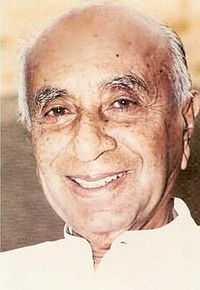 |
Karachi, Sindh | Key presiding figure of the Muslim League Rallied Sindh's support for Pakistan movement |
| Abdur Rab Nishtar (1899–1958) |
Peshawar, Khyber-Pakhtunkhwa | Governor of Punjab First Minister of communications | |
| Huseyn Suhrawardy (1892–1963) |
Dhaka, Bengal | First Prime Minister of Pakistan of Pakistan Enforcer of One Unit | |
| Mohammad Ali Jouhar (1878–1931) |
Rampur, Uttar Pradesh | Muslim cleric and leader of Khilafat Movement Key presiding figure of the Muslim League | |
| Shaukat Ali (1873–1939) |
 |
Rampur, Uttar Pradesh | Muslim cleric and leader of Khilafat Movement Key presiding figure of the Muslim League |
| Jalal-ud-din Jalal Baba (1903–1981) |
Abbottabad, Khyber Pakhtunkhwa | Founder of Hazara Muslim League Senior Muslim Leaguer and winner of referendum in NWFP | |
| Zafar Ali Khan (1873–1956) |
Wazirabad, Punjab | and Poet of Urdu language | |
| Ra'ana Ali Khan (1905–1990) |
.jpg) |
Almora, United Provinces | First Lady of Pakistan Governor of Sindh Initiated Women military corps Widely known as Māder-e-Pakistan" |
| Jogendra Nath Mandal (1904–1968) |
Dhaka, Bengal | First Law Minister of Pakistan | |
| Victor Turner (1894–1972) |
London United Kingdom | Founded Federal Board of Revenue First Finance Secretary of Pakistan Founder of Pakistan Civil Services | |
| Khaliq-uz-Zaman (1899–1963) |
Rampur, Uttar Pradesh | Presiding figure of the Muslim League | |
| Jahanara Shahnawaz (1896–1979) |
 |
Lahore, Punjab | Crucial role in women legislature after the independence. |
| Nasir Ahmad Malhi (1903–1991) |
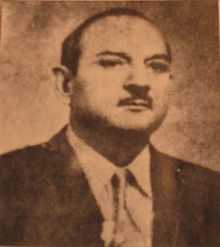 |
Montgomery, Punjab | First Minister of Education |
Notable activists
The activities and constant public gathering of founding fathers of Pakistan attracted the people of the North-West India to be politically active in the movement. Many of the activists would later becoming the future leader of the country.
| Name (Birth and date) | Portrait | Place of representation and origin | Pre-independence and Post-independence notability |
|---|---|---|---|
| Shireen Jinnah (18??–19??) |
Karachi, Sindh | Sister of Jinnah | |
| Muhammad Asad (1900–1992) |
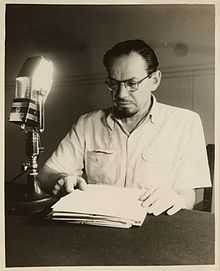 |
Lemberg, Austria-Hungary | Honorary figure in Pakistan |
| Sartaj Aziz (1929–) |
.jpg) |
Mardan, Khyber-Pakhtunkhwa | National Security Adviser (2013–Present) Played key role in the political events in Pakistan, including that of nuclear tests in 1998 Professor of Economics at various universities of Pakistan. |
| Rafiq Tarar | Gujranwala, Punjab | 9th President of Pakistan (1997–2001) | |
| Mir Hazar Khoso | Jaffarabad, Balochistan | Acting Prime Minister of Pakistan (25 March 2013 – 4 June 2013) | |
| Nurul Amin (1893–1974) |
Shahbazpur, Bengal | Prime Minister of Pakistan (7 December–20 December 1971) Only Vice-President of Pakistan | |
| Alvin Robert Cornelius (1903–1991) |
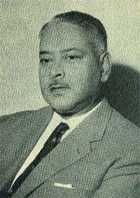 |
Agra | Chief Justice of Pakistan (1960–1968) |
See also
- Pakistan
- Dominion of Pakistan
- Muhammad Ali Jinnah
- Indian independence activists
References
- ↑ 1.0 1.1 1.2 Cohen, Stephen P. (2004). The idea of Pakistan (1. paperback ed.). Washington, D.C.: Brookings Institution Press. ISBN 0815715021.
- ↑ Akhtar, PAF, Air Marshal Masood (28 October 2011). "Six Suggested Founding Fathers' Vision Documents for Pakistan... II". Pakistan Tribune. 2011. Retrieved 31 January 2014.
- ↑ 3.0 3.1 Dani, edited by Ahmad Hasan (1998). Founding fathers of Pakistan. Lahore: Sang-e-Meel Publications. ISBN 9693508300.
- ↑ Staff editors. "Guiding Principles of Pakistan’s Foreign Policy". Ministry of Foreign Affairs (MoFA). Retrieved 30 January 2014.
- ↑ Hasnat, Syed Farooq (2011). Pakistan. Santa Barbara, Calif.: Praeger. ISBN 978-0-313-34697-2.
- ↑ Chitkara, M.G. (1996). Nuclear Pakistan. New Delhi: A.P.H. Pub. Corp. ISBN 8170247675.
- ↑ Pande, Aparna (2008). Explaining Pakistan: Escaping India. New Delhi India: Routledge. ISBN 1136818944.
- ↑ 8.0 8.1 Administrators et al. (1 June 2003). "Partition of Bengal". Nazaria-e-Pakistan. Story of Pakistan (Pre-Independence, part-I). Retrieved 1 February 2014.
- ↑ Abdul Rashid Kahn, "All India Muhammadan Educational Conference and the Foundation of the All India Muslim League," Journal of the Pakistan Historical Society (2007) Vol. 55 Issue 1/2, pp 65–83.
- ↑ 10.0 10.1 staff. et al. (1 June 2003). "Simla Deputation". Nazaria-e-Pakistan. Nazaria-e-Pakistan (Story of Pakistan, Simla Deputation). Retrieved 1 February 2014.
- ↑ 11.0 11.1 Staff. "Establishment of All India Muslim League". Nazaria-e-Pakistan Trust (AIML). Retrieved 1 February 2014.
- ↑ Staff. "The Struggle for Independence". Nazaria-Pakistan Trust (Independence timeline). Retrieved 1 February 2014.
- ↑ 13.0 13.1 et al. (1 January 2007). "The Constituent Assembly". Nazaria Pakistan, (Post-Independence, part I). Retrieved 1 February 2014.
- ↑ 14.0 14.1 14.2 14.3 Ekbal, Nikhat (2009). Great Muslims of undivided India. Delhi: Kalpaz Publications. ISBN 8178357569.
